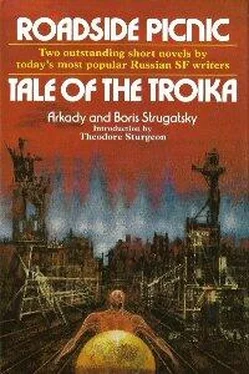Detecting our presence, Fedor Simeonovich stopped in his tracks.
“And here they are in person,” he said without his customary smile. “P-p-please sit down. T-t-time is short. K-K-Kamnoedov is a blowhard, but he’ll be through soon. Ch-Christo, why don’t you ex-ex-explain the circumstances, it always comes out badly when I try.”
We sat down. Christobal Joséevich, his right eye squinting from the smoke, looked at us critically.
“I’ll explain, if you wish,” he said to Fedor Simeonovich. “The circumstances are such, young men, that the first people to reach the seventy-sixth floor should be those of us who are experienced and wise. Unfortunately, the administration feels that we are too old and too venerable to go on the first experimental launch. Therefore, you are going, and I warn you right now that this will not be a simple trip, but reconnaissance, and perhaps reconnaissance under fire. You’ll need stamina, courage, and the utmost discretion. Personally, I do not observe any of these qualities in you, but I defer to the recommendation of Fedor Simeonovich. And in any case, you must know that you will most likely be in enemy territory—a merciless, cruel enemy who will stop at nothing.”
That preface made me start sweating, but then Christobal Joséevich began explaining how things stood.
It turned out that on the seventy-sixth floor lay the ancient city of Tmuskorpion, seized as a trophy of war, way back when, by the vengeful Prince Oleg the Prophetic. From time immemorial Tmuskorpion was the center of strange phenomena and the site of strange events. Why this was so, no one knew, but everything that could not be rationally explained at any stage of scientific and technological progress was sent there to be preserved for better times.
Back in the days of Peter the Great, at the same time that his famous museum, the Kunstkamera, was being founded in St. Petersburg, the local Solovetsk authorities, in the person of Lieutenant Bombadier Ptakha and his company of grenadiers, established “His Imperial Majesty’s Kamera of Marvelous and Amazing Kunsts with a Prison and Two Steambaths” in Tmuskorpion. In those days, the seventy-sixth floor was the second floor, and it was a lot easier to get into His Imperial Majesty’s Kamera of Kunsts than into the baths. But later, as the Edifice of Knowledge grew, access to it became increasingly difficult, and ceased completely with the appearance of the elevator. Meanwhile the Kamera of Kunsts kept growing, enriched by new exhibits, and became the Imperial Museum of Zoological and Other Natural Wonders under Catherine the Great, the Russian Imperial Preserve of Magical, Spiritual, and Occult Phenomena under Alexander II, and finally, the State Colony of Unexplained Phenomena under the Research Institute for Magic and Wizardry of the Academy of Sciences.
The destructive consequences of the invention of the elevator impeded the exploitation of the treasure trove for scientific research. Business correspondence with the administration was extremely difficult and inevitably drawn-out: cables lowered with correspondence snapped under their own weight; carrier pigeons refused to fly that high; radio communications were shaky because of the backwardness of Tmuskorpion’s technology; and the use of lighter-than-air craft merely led to needless expenditure of the limited supplies of helium. But all that is history now.
Some twenty years ago the berserk elevator dropped off the Inspection Commission of the Solovetsk Committee on Municipal Economy on the seventy-sixth floor. They had come simply to discuss the stopped-up plumbing in the labs of Professor Vybegallo on the fourth floor. What precisely went on remains unknown. Vybegallo, who was waiting for the commission on the fourth floor, recounts that the elevator rushed up past him with a terrifying roar, the glass door showing a glimpse of distorted faces, and then the horrifying vision passed. Exactly an hour later the elevator car was discovered on the thirteenth floor in a lather, snorting, and still trembling from excitement. The commission was not in the car. A note was glued to the wall, written on the back of a form for reporting unsatisfactory conditions. It said: “Am going out to examine. I see a strange rock. Comrade Farfurkis has been reprimanded for going into the bushes. Chairman of the Commission, L. Vuniukov.”
For a long time, no one knew on what floor L. Vuniukov and his subordinates had disembarked from the elevator. The police came, and there were many awkward questions. A month later, two sealed packages addressed to the head of the Municipal Economic Committee were found on the roof of the car. One package contained a packet of decrees on cigarette paper that recorded reprimands of Comrade Farfurkis or Comrade Khlebovvodov, for the most part for displaying individualism and some inexplicable “Zuboism.” The second package contained the materials for a report on the plumbing in Tmuskorpion (the conditions were acknowledged to be unsatisfactory) and an application to Accounting for extra pay for high-altitude duty.
After this, correspondence from above became rather regular. First came the minutes of the meetings of the Inspection Commission of the Municipal Economic Committee, then of the Special Commission on Examining the Situation, then suddenly the Temporary Troika on Examining the Activity of Commandant Zubo of the Colony of Unexplained Phenomena, and finally, after three reports in a row on “criminal negligence,” L. Vuniukov signed in as Chairman of the Troika on the Rationalization and Utilization of Unexplained Phenomena. The newly formed triumvirate stopped sending down minutes and began sending instructions and decrees. These documents were terrifying in form and content. They gave incontrovertible evidence that the former commission of the Committee on Municipal Economy had usurped power in Tmuskorpion and that it was incapable of wielding such power rationally.
“The greatest danger,” Christobal Joséevich continued in his even voice, sucking on the extinguished cigar, “is the fact that these rascals have the well-known Great Round Seal in their hands. I hope that you realize what this means.”
“I understand,” Eddie said quietly. “You can’t hack it out even with an ax.” His clear face clouded over. “What if we use the humanizer?”
Christobal Joséevich looked at Fedor Simeonovich.
“You can try, of course,” he said, shrugging. “However, I’m afraid that things have gone too far.”
“N-n-no, why do you say that?” Fedor Simeonovich countered. “T-try it, t-try it, Eddie. They’re not automatons up there. B-by the way, V-V-Vybegallo is up there, too.”
“How come?”
It seemed that three months ago a demand had been sent down for a scientific consultant at a fantastic salary. Nobody believed the salary offer, least of all Professor Vybegallo, who at that time was just finishing up a major project on developing, through reeducation, a worm that would bait itself on a hook. Vybegallo announced to all ears at the academic council his distrust of the offer and ran away that same evening, leaving everything behind. Many saw him, briefcase in his teeth, clambering up the inner wall of the elevator shaft, getting out on floors divisible by five to replenish his strength at the snack bars. A week later a decree was lowered, stating that Professor A. A. Vybegallo had been appointed scientific consultant to the Troika at the promised salary, with bonuses for his knowledge of foreign languages.
“Thanks,” said polite Eddie. “That’s valuable information. Shall we go?”
“Go, go, my dear friends,” Fedor Simeonovich said, touched to the quick. He peered into the magic crystal. “Yes, it’s time. Kamnoedov is g-getting to the end of his s-s-speech. B-be careful up there. It’s a c-creepy, terrifying place.”
Читать дальше












